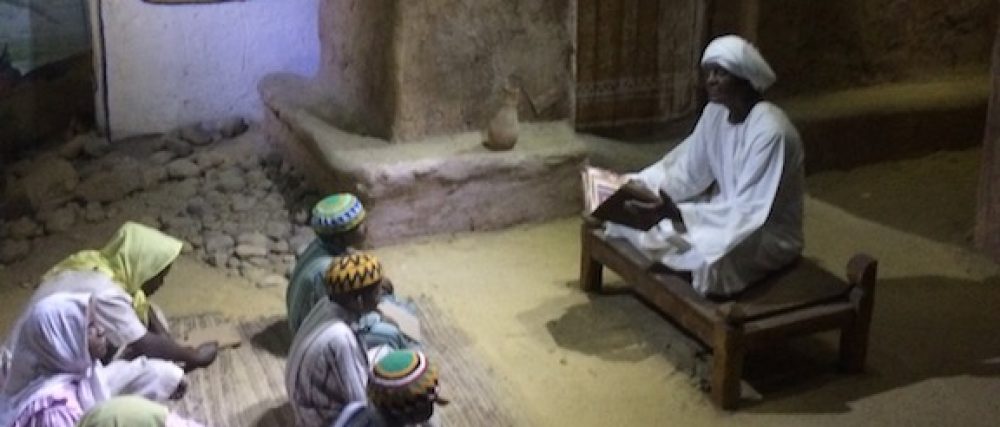The declaration of a free national name and religion is a concept that was popularized by Noble Drew Ali, founder of the Moorish Science Temple. He rejected a color-based identity in favor of one based on heritage. While I am not an expert on Moorish Science, I found a fitting parallel to this concept in the history of Copts in Egypt, one of the oldest Christian sect in the world.
Some years ago, I came across a documentary series about various Arab religious communities on Al Jazeera. In the episode about the Copts, there was an interesting remark made by Pope Shenouda III, the Patriarch of the Coptic Orthodox Church in Alexandria, Egypt. Starting around the 5:20 until the 5:40 mark he states what can be translated as:
“The origins of the Copts are Pharaonic and not Arabic. However, they now possess Arab citizenship and the Arabic language, but their origins are not Arab.”
Arabization in Egypt
The Coptic Christian community of Egypt are not ethnically Arabs, despite being native Arabic speakers and being physically indistinguishable from other Egyptians. Technically, their ethnicity should represent the majority in Egypt and their presence predates Arab Muslim hegemony in the region. The same can be said of Berbers in Northwest Africa. How is it, then, did they assume an Arab identity?
It suffices us to know that Arabization in Egypt, like much of North Africa, was a slow and complicated process. The early Muslims played a major role in ending Byzantine oppression of indigenous Christian sects in Egypt and the rest of North Africa in 7th century CE. Their initial social contract was that of a dhimmi status, which guaranteed them protection as long as they paid the jizyah tax.
The Cairo Geniza papers reveal the rich linguistic environment of the Nile between the 3rd century BCE and the 7th century CE. These papers consist of papyri written in languages such as Hebrew, Syrian, Ethiopian, Middle Persian, and hieroglyphics to name a few. However, the majority of these documents are in Arabic, Coptic, and Greek. They suggest that by the 7th century Arabic was used side-by-side with Coptic and Greek until 705 when a decree made Arabic the official administrative language.
We know that by the 12th century Pope Gabriel II (Ibn Turayk) had officially made Arabic the language of Coptic liturgy. His reasoning for this was that Copts had already been Arabized and that they should worship in a language they understand.[1] Of course, the true extent of Arabization at this point in time is debatable. Perhaps only urbanized Copts had become comfortable with conversing in Arabic, while rural Copts were not.
Furthermore, scholarship on the topic shows that there were a number of factors that led to the ultimate Arabization of Egypt.These factors were an interplay of “Arab” migration, their intermarriage with Coptic women, willing and coerced conversion to Islam, popular Muslim distrust of and violence against Copts, and official policies of the state. (To learn more read: Coptic Conversion and the Islamization of Egypt and Coptic Language and Identity in Ayyūbid Egypt).

Lessons for America
Even after a difficult history under Muslim rule, the Coptic population has survived as Egypt’s largest national minority. While their Arabness is a topic of continued debate in their communities and within Egypt, I will suggest a few lessons that the so-called African American can learn from this history.
- As we note from Pope Shenouda II’s statement, the Coptic community is an indigenous community with a distinct heritage. While their heritage is initially Pharaonic, it is their Christian heritage that allows them to maintain a social contract under Muslim rule. It is an Islamic belief that Islam abrogated Christianity, just as Christianity abrogated Judaism and so forth, which might have served as the basis for Muslims’ harsh treatment of the Copts throughout history, especially after the Crusades.
- However, it was only after they proclaimed their free national and religious identity that they were able to attain Arab citizenship. While much was lost in this transaction, they were also able to maintain their legal sovereignty in a nation ruled by Islamic law. In fact, Islamic law, like American law, guaranteed them the right to govern themselves.
- Additionally, by Arabizing their heritage they were able to preserve what they could of their history in a living language. This is an important point for so-called African Americans, as the language of our history and scholarship provides access to different audiences and influences the types of discussions we have around topics of concern to us.
- Finally, their citizenship is not simply tied to a nation (Egyptian), but to a heritage (Arab). As Arab citizens, the Copts were not only able to secure a place within Egyptian society, but in the greater Arab world. As Arab citizens, they have the right to produce culture, scholarship, and engage in the current events of the Arab world.
[1] This argument is reminiscent of the contemporary argument for the use of colloquial Arabic in the Arab world. See Is Fusha Elitist?
